Lowell Week in Review: July 26, 2015
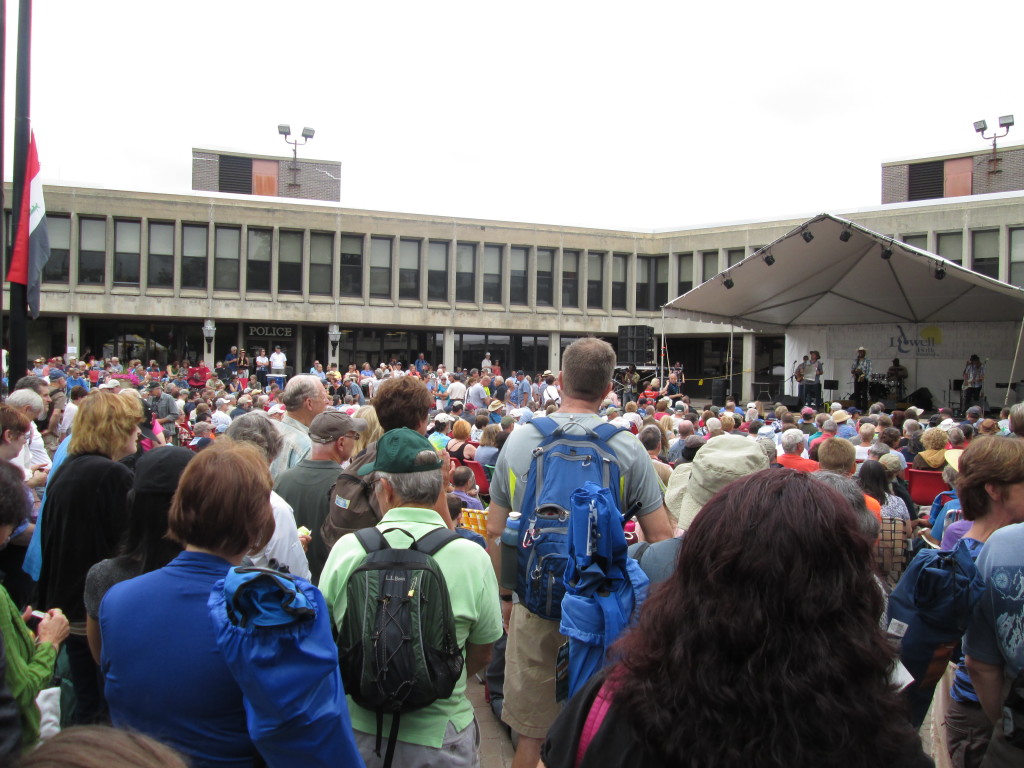
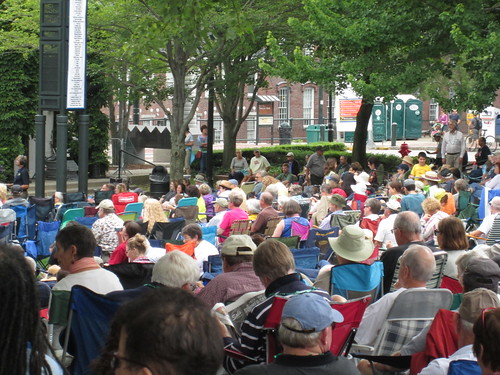
Lowell Folk Festival
Who knew that overcast with temperatures barely reaching 70 was perfect weather for an outdoor folk festival at the end of July? That certainly seemed to be the case yesterday roaming around downtown Lowell. The crowd seemed as large as ever and all comments heard were positive. Rather than camp out at a single venue and catch multiple acts, I make a continuous circuit from the Dutton Street Dance Pavilion to the Market Street Stage, then over to St. Anne’s Church, down John Street o Boarding House Park, up Lucy Larcom to JKF Plaza and then repeat, over and over again. Along the way, I heard some great music, ate some food (Thai, in my case), took plenty of pictures and talked to many people.
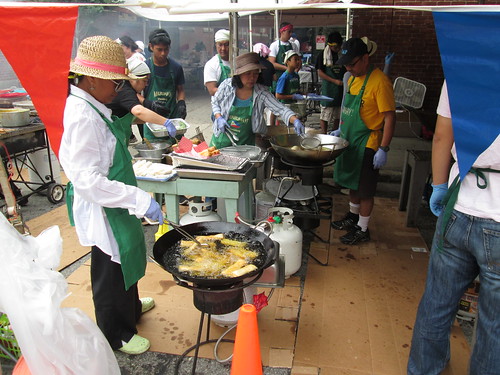
My co-blogger, Paul, did a great job of capturing the feel of the day in a post last night, so please check it out if you haven’t already done so. I’ll be back at the festival today, rain or shine, and will have another report tomorrow.
Lowell Walks
After a week off for the Folk Festival, Lowell Walks resumes next Saturday with Bob Forrant of the UMass Lowell History Department leading a walk on Abolitionism in pre-Civil War Lowell. As always, the tour begins at 10am on Saturday at the National Park Visitor Center on Market Street. It’s free and no advance registration is required. The complete schedule of Lowell Walks is here.
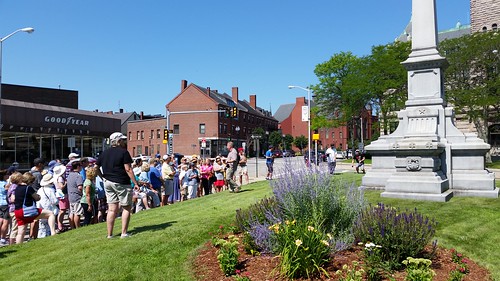
Dave McKean at Ladd & Whitney Monument
City Council Meeting
I missed the last city council meeting which was two weeks ago and haven’t had a chance to see it on replay yet. There’s a council meeting this coming Tuesday (June 28, 2015). The agenda lists 18 motions. I won’t go through all of them. Several deal with walking in downtown (including two that mention “jaywalking”). There will also be a presentation on the state highway department’s plans to realign Bridge Street at the VFW Highway. I plan to watch the meeting and to post a full report Tuesday night.
City Election Calendar
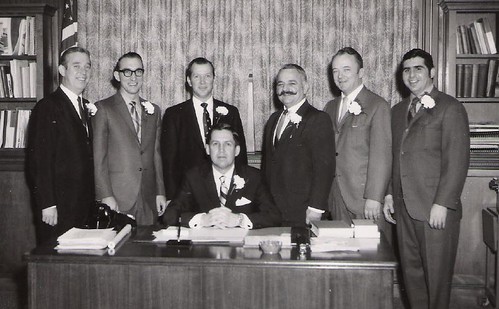
1970-71 Lowell School Committee
With the lineup of candidates for this fall’s city election shaping up in interesting ways and thereby grabbing the interest of more city voters, I thought it might useful to review some related dates:
July 31, 2015 (Friday) Last day to obtain nomination papers for city council and school committee (by 5pm);
August 4, 2015 (Tuesday) Last day to file nomination papers (by 5pm);
August 19, 2015 (Wednesday) Posting of list of candidates;
August 21, 2015 (Friday) Drawing of ballot position for preliminary election if needed (at 10am);
September 22, 2015 (Tuesday) Preliminary Election (if needed);
October 14, 2015 (Wednesday) Last day to register to vote in city election
November 3, 2015 (Tuesday) City Election
A couple of observations: The purpose of a preliminary election is to cut the number of candidates to double the number to be elected. For the council, only the first 18 finishers in the preliminary would proceed to the general election; for the school committee, it would be the first 12. If there are fewer than 19 candidates who qualify for the council ballot, then there would be no council preliminary; if there are fewer than 13 candidates who qualify for the school committee ballot, there would be no school committee preliminary. If there are 19 candidates for council but only 12 for school committee, then there would be a council preliminary but no school committee preliminary.
Despite 4 of the 6 current members of the school committee not seeking re-election to that board (Kristen Ross-Sitcawich and Kim Scott are not running while Dave Conway and Jim Leary are both running for the city council), there seem to be enough new candidates running for school committee to make a preliminary election for that office necessary; the council seems less likely to require a preliminary.
Here’s a recap of the 2013 City Council Preliminary election (there were not enough school committee candidates to hold a preliminary. A total of 6696 of 55,708 registered voters (12%) cast their ballots in the September 24, 2013 Lowell preliminary election. The purpose of this election was to reduce the total number of candidates for the final election on November 5, 2013 from 22 to 18. The four candidates eliminated were Matt Vieira, Darius Mitchell, Brandon Navom and Rick Misitano. Here are the results of the preliminary city council election:
1. Rita Mercier – 3681
2. Rodney Elliott – 2764
3. Bill Martin – 2748
4. Dan Rourke – 2704
5. Ed Kennedy – 2652
6. Jim Milinazzo – 2541
7. Bill Samaras – 2485
8. John Leahy – 2359
9. Marty Lorrey – 2305
10. Joe Mendonca – 2001
11. Vesna Nuon – 1984
12. Corey Belanger – 1926
13. Derek Mitchell – 1908
14. Eric Gitschier – 1906
15. Stacie Hargis – 1774
16. Van Pech – 1478
17. Genevieve Doyle – 1213
18. Fred Doyle – 1096
19. Matt Vieira – 802
20. Darius Mitchell – 569
21. Brandon Navom – 401
22. Rick Misitano – 355
Here are the results of the 2013 City Election. The turnout: 11,581 out of 56,093 registered voters (20.6%) participated. Three incumbents (Marty Lorrey, Joe Mendonca, and Vesna Nuon) lost and a fourth, Patrick Murphy, did not seek reelection. That brought on four new councilors: Dan Rourke, Jim Milinazzo, Bill Samaras and Corey Belanger. Here are the final results for City Council, School Committee, and Vocational School Committee:
City Council
1. Rita Mercier – 6346
2. Rodney Elliott – 5301
3. Edward Kennedy – 5077
4. Daniel Rourke – 4644
5. James Milinazzo – 4608
6. William Samaras – 4462
7. Corey Belanger – 4384
8. William Martin – 4331
9. John Leahy – 4299
10. Marty Lorrey – 4121
11. Joe Mendonca – 3985
12. Derek Mitchell – 3949
13. Erik Gitschier – 3913
14. Stacie Hargis – 3528
15. Vesna Nuon – 3243
16. Van Pech – 2271
17. Fred Doyle – 1584
18. Genevieve Doyle – 1456
School Committee
1. Jim Leary – 6403
2. Steve Gendron – 6353
3. Dave Conway – 6349
4. Connie Martin – 5505
5. Kim Scott – 5370
6. Kristen Ross-Sitcawich – 5251
7. Robert Gignac – 4869
Greater Lowell Vocational
George O’Hare – 6231
Fred Bahou – 6007
Bopha Peou – 3547
The prevailing wisdom has always been that preliminary elections benefit incumbents more than challengers since a poor finish in the preliminary can serve as a wake-up call while a poor finish in the general election can be a stunning loss. The same thought process was that a challenger had a better chance of ambushing a sleepy incumbent in a general election than in a preliminary.
The last city council election caused me to develop a different opinion about the effect of preliminaries in city elections. The natural tendency of the closest supporters of a candidate is to be stingy with their votes. While everyone can cast nine votes for council, if you, your spouse, your sibling or someone else with whom you have a close relationship is a candidate, you’re unlikely to cast votes for anyone but your favorite. What if you did and the other candidate you voted for defeated your favorite by a single vote? So there ends up being a lot of “bulleting” which means voting for only one candidate. But if there is a preliminary election and your candidate finishes very strongly, you can be less concerned about him or her being edged out by a single vote. Instead, you start thinking about which other candidates would be good complements on the council or school committee to your favorite. You then vote for someone who could be part of a coalition that would make your favorite’s tenure more successful. In this way, like-minded candidates who finished relatively poorly in the preliminary, can leapfrog over others in the general election.
Without getting into names (because I don’t have time to do the research right now), that’s what I think happened in the last city council race. My point? Whether or not there is a preliminary election matters.
An exception may be for those election cycles where the council successfully petitions the State Legislature to forego the preliminary election when the candidate count marginally exceeds the limit of 18. For example, if there were 20 candidates, of which 8 were incumbents, foregoing the preliminary election would result in 8 incumbents and 12 “challengers”, whereas those numbers would be 8 and 10 respectively (most likely) had the preliminary election been held. Any anti-incumbent block of voters would have more watering down of the opposition with the former case.